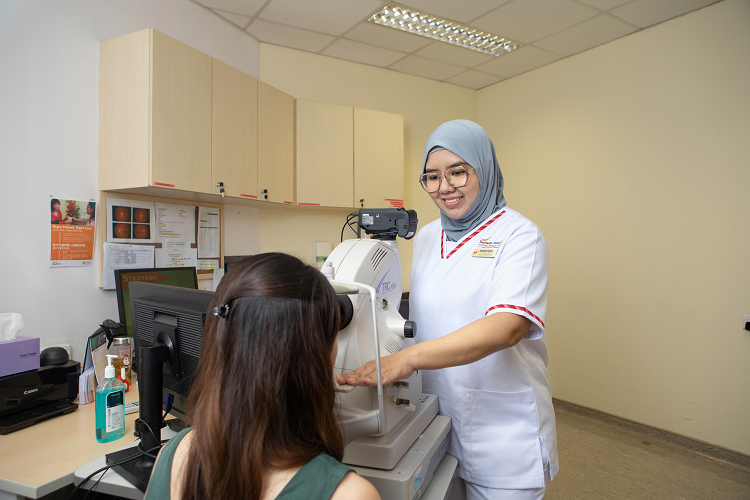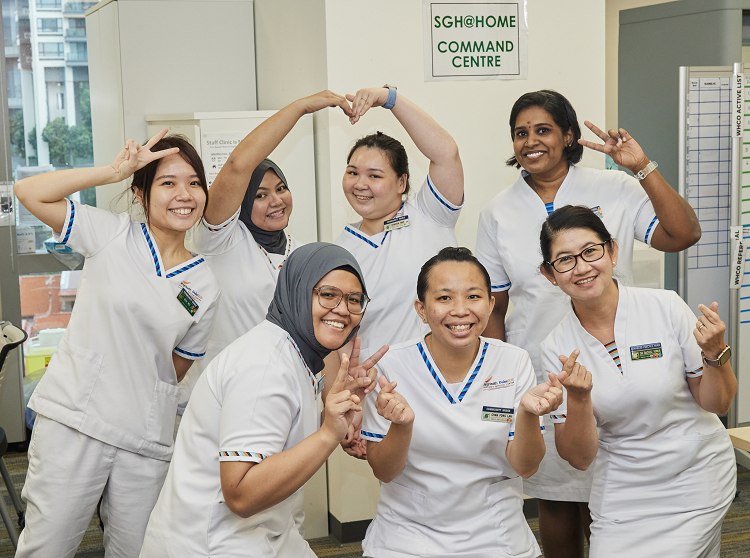These nurses are actively helping Singaporeans take steps towards better health in the community.
Championing a healthy start to life
Senior Nurse Manager Joanne Yap Bee Eng began her work in community nursing in 2016 — she was part of the team that launched Changi General Hospital’s (CGH) Community Nursing Programme. Today, the veteran nurse with 28 years of experience leads 50 community nurses who are serving Singapore’s eastern districts such as Bedok, Tampines, Simei and Pasir Ris.
With the expertise gained over the past seven years, Joanne and her team, alongside the SingHealth Office of Regional Health (SORH) and Ministry of Social and Family Services (MSF), initiated a new programme to expand community nursing services to mothers and children living in the east. The Women’s and Children’s Health Services at Family Nexus was soft-launched in November 2022 at Our Tampines Hub. “Our goal is to provide support and early intervention through educational health talks and lifestyle counselling sessions, to help children develop good lifestyle habits and grow up healthily, paving the way for a better quality of life in their later years,” explained Joanne, who heads this two-year pilot community nursing programme. “With Singapore implementing Healthier SG, our team now has a bigger role to play.”
Joanne was involved in developing a robust framework for the new service, collaborating with other SingHealth institutions such as KK Women’s and Children’s Hospital, National Dental Centre Singapore,and SingHealth Polyclinics to train and upskill the team in order to better meet the needs of women and children, as well as engaging community partners and social service agencies to strengthen the ecosystem of support, and raising awareness of the programme within the community.
The programme’s focus has been on child health services, with nurses supporting mothers in the neighbourhood by monitoring developmental milestones and oral health for children up to six years old. Joanne shared an example of a mother who was concerned about her pre-schooler’s progress. “Through assessments to measure the child’s cognitive and motor skills, we were able to reassure the mother that her child was fine,” Joanne revealed. As for oral health, her nurses check for visible decay and cavities, and refer the child for further management if required. With positive feedback from parents, the team will expand their services to include preconception health and post-delivery care.
Support for breastfeeding and the mental well-being of new mothers, particularly first-time mothers, is also in the plan. Joanne added that the programme aims to integrate health and social elements. “For example, we would like to partner pre-schools and educate the community on how they can better take care of themselves and their families,” she explained.
When asked what keeps her motivated, Joanne said, “Seeing my nurses grow from being novices to experts gives me a sense of achievement. When patients recognise nurses for the good work they do, that gives me joy.”
Advocate for diabetics

When Senior Enrolled Nurse Norhafiszah Binte Abdul Latiff was in secondary school, she joined the Red Cross Cadets and volunteered at a nursing home, where she was inspired to pursue a career in nursing after witnessing the nurses there at work.
Norhafiszah has been a nurse for 14 years, the last five in SingHealth Polyclinics – Sengkang, where the mother to a pair of eight-year-old twins performs diabetic foot and eye screenings. Some of her patients are as young as 23, a trend she finds worrying. Many of them have poor lifestyle practices, such as smoking and unhealthy diets. This is where she has decided to make a difference.
Norhafiszah is relentless in getting them to adopt healthier habits, such as following a well-balanced diet, reducing stress, quitting smoking and getting enough rest. “This prevents complications from diabetes,” she explained. She also urges them to exercise regularly, as leading a sedentary lifestyle contributes to the disease. “I tell them to start by walking at least 30 minutes a day,” she said. When patients who have followed her advice report that their blood sugar levels have dropped, she shares these ‘victories’ with other patients to keep them motivated.
Norhafiszah is an advocate of regular screening. She educates patients on the importance of early detection so that preventive action can be taken to avoid complications like heart and kidney diseases. “Empowering them with this information reassures me that the work I do truly makes a difference,” she shared.
Her station sees as many as 40 patients a day for foot screening. One challenge she faces is getting patients to use the right footwear. For diabetics, wearing closed shoes is vital to prevent injuries and cuts. “Some patients may not want to change the type of their footwear because they don’t find the shoes comfortable, or are reluctant to incur extra costs,” she said. But she remains committed to teaching patients how to select the right footwear.
She also administers eye screening tests for diabetic patients. “If they are in the clear, we advise them to repeat a screening once a year. If there are minor abnormalities, they should be screened every six months,” she added.
With diabetes being so prevalent in Singapore, Norhafiszah is proud to do her part to keep the disease under control. “When I see my patients get better from their treatment and appreciate the help I’ve given them, I feel deeply encouraged, and that motivates me to keep going in my job,” she said.
Supporting the frail elderly
%20-%201_cropped.jpg)
A community nurse for 13 years, Zhang Jin has attended to patients in unusual places, including HDB void decks and stairways, as patients sometimes request for care to be done outside their homes. This is par for the course for the native of Shanxi, northwestern China, who came to Singapore 20 years ago to be a nurse. “In a hospital setting, you have access to the necessary resources. As a community nurse, you work independently and must be resourceful and think on your feet,” she shared.
Visiting different homes has enabled her to manage people from different backgrounds. This has been useful in her current role as Nurse Clinician of Ageing Successfully in Place – Independent Rewarding Lives (ASPIRE), a community-based geriatric intervention pilot project, where she attends to patients aged 65 and above who are frail and require follow-ups by geriatricians. Patients who meet the above criteria are recruited for the programme at partnering clinics (General Practitioners or Polyclinics).
Zhang Jin then performs a comprehensive geriatric assessment of the patients’ functionality, fall risk, incontinence and nutrition status, and psychosocial needs. For ASPIRE, Zhang Jin is part of a multidisciplinary team comprising doctors, physiotherapists, occupational therapists, social workers, dietitians and community partners. Depending on the outcome of the patient’s assessment, she then refers the patient to the subject matter expert in the team for follow-up. Cognitive impaired patients, for example, are placed under the care of a geriatrician for further investigation, while those suffering from malnutrition will be referred to a dietitian.
Most people think that frailty is a normal part of ageing, but this is not so, stressed Zhang Jin. There are multiple contributing reasons that can be prevented with early interventions. She and her colleagues have attended to more than 270 patients since the programme began three years ago.
ASPIRE has been well-received. A daughter who accompanied her mother for the programme was so impressed that she referred her father to it. Another elderly couple who were due to be discharged from their physiotherapy sessions were keen to continue as the scheme is subsidised, with the first session being free and subsequent ones costing $10 each. However, to continue the rehab session, they had to be referred to a community partner, as patients are only allowed to be on the programme for a year.
According to Zhang Jin, her work as a community nurse has helped her grow professionally and personally. “Through regular case discussions in a multidisciplinary team, I have been able to expand my knowledge on caring for patients with certain conditions. As a person, I have also grown to be a lot more patient and appreciative of what I have,” she said.
Enabling at-home care

Photo: Juweita (front left) with her team of SGH@Home community nurses.
A ward nurse in internal medicine since 2005, Nurse Clinician Juweita Binte Arba’in ventured into community nursing in 2019 as she was passionate about providing care for patients beyond the hospital walls and empowering them to stay well. She spearheaded the new Hospital at Home model of care at Singapore General Hospital (SGH) in 2021 with a team of five community nurses. She now works with a private healthcare provider to ensure continuity of care at home after hours.
The programme aims to relieve bed capacity in SGH by supporting early discharge of patients who still require hospital care but whose conditions can be safely managed at home. When COVID-19 hit, SGH@Home was converted into a COVID-19 virtual ward to support the early discharge of stable COVID-19 patients. Juweita worked closely with the Family Medicine and Continuing Care department to develop guidelines for this care model. “To date, we have enrolled more than 2,000 patients and saved more than 7,714 hospital beds,” said Juweita.
The project she is proudest of, however, is the Dr Buddy app, developed jointly by SingHealth and A*Star, for patients to monitor their vital signs while recovering at home. Juweita recalled how the team spent sleepless nights gathering information to design a viable platform within a short time. Now, patients report their vital signs via the app in less than five minutes, down from the 10 to 15 minutes that a nurse would have spent verifying the patient’s verbal report.
Another noteworthy project Juweita was involved in is the Hospital at Home (HAH) Buddy, which addresses the issue that community nurses often cannot find a suitable area in homes to perform their duties. HAH is a movable structure that provides space for storage, laying out items for nursing care procedures, and securing holders for items such as IV fluid bags, drains and urine drainage bags. The prototype has been tested in 10 homes and feedback has been positive.
Despite juggling work and family, Juweita is always available to her team’s needs. She was awarded the SGH Genuine Care Award 2022 in recognition of her empathetic leadership. “As the team leader, I try to keep everyone motivated and provide positive encouragement, especially because SGH@Home is a new care model. I feel honoured to receive this award,” said Juweita.
To read more stories of our extraordinary nurses, download the Singapore Health Special Nursing Supplement.
